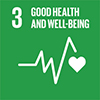Tuberculosis remains one of the top 10 causes of death in the world. With just one vaccine and ineffective antibiotics for the disease, researchers at RCSI have developed a new treatment with the potential to be scaled-up and mass-produced for clinical testing.
The treatment, which patients will take using an inhaler, works by reducing bacteria in the lungs that causes tuberculosis (TB), while also helping the patient’s immune system fight the disease.
The pathogen that causes tTB spreads by people breathing infected droplets into their lungs, where the disease can remain dormant or spread further. The research makes use of a derivative of vitamin A called all-trans retinoic acid (atRA), which previous studies have shown is an effective treatment for tuberculosis.
Using a spray-drying process, the researchers packaged atRA within safe-for-consumption particles that are small enough to use in an inhaler. These particles efficiently delivered the treatment and significantly reduced tTB-causing bacteria and associated lung damage, which supports their potential for clinical testing.
Watch the video and learn more about this novel treatment
TB is one of the top 10 causes of death worldwide. The World Health Organisation (WHO) data shows that 10 million people fell ill with TB and 1.6 million died from the disease in 2017. WHO estimates that there were 558,000 new cases with resistance to the most effective first-line antibiotic. Of those resistant to the drug, 82% were resistant to multiple antibiotics.
There is only one vaccine for TB, developed in 1921. It is unreliable in preventing the most common form of TB, and is not suitable in all patient groups. The vaccine works best against specific forms of TB and is usually given to infants in at-risk populations.
Funded by the Health Research Board (HRB) and the Royal City of Dublin Hospital Trust, the research is published in the European Journal of Pharmaceutics & Biopharmaceutics.
The work, led by Dr Gemma O’Connor and Professor Sally-Ann Cryan in RCSI, was carried out in collaboration with research teams in St James’ Hospital, Trinity College Dublin and Imperial College London. Prof. Joseph Keane and Dr Mary O’Sullivan led the team at St James’ Hospital and Trinity College Dublin, with Dr Brian Robertson and Dr Nitya Krishnan leading the team at Imperial College London.
RCSI is committed to achieving a better and more sustainable future through the UN Sustainable Development Goals.

